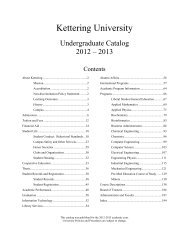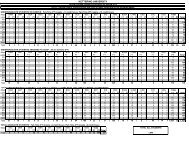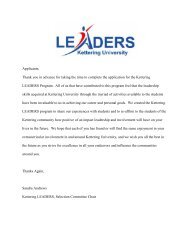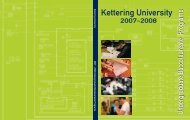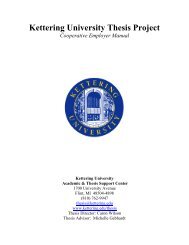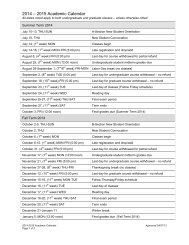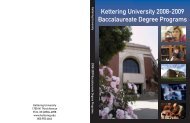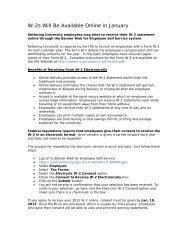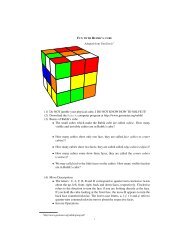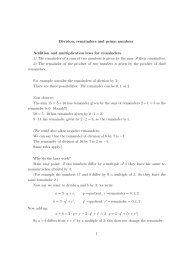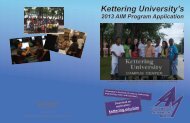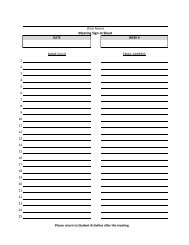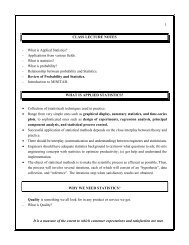2006-2007 Undergraduate Catalog - Kettering University
2006-2007 Undergraduate Catalog - Kettering University
2006-2007 Undergraduate Catalog - Kettering University
You also want an ePaper? Increase the reach of your titles
YUMPU automatically turns print PDFs into web optimized ePapers that Google loves.
Copyright & Disclaimer Information: Copyright © 1994, 1995, 1996, 1997, 1998, 1999, 2000, 2001, 2002, 2003, 2004, 2005, <strong>2006</strong>, <strong>2007</strong>. CollegeSource®, Inc. and Career Guidance Foundation. CollegeSource® digital catalogs are derivative works owned and copyrighted by CollegeSource®, Inc. and Career Guidance Foundation. <strong>Catalog</strong> content is owned and copyrighted by the appropriate school. While CollegeSource®, Inc. and Career Guidance Foundation provides information as a service to the public, copyright is retained on all digital catalogs.<br />
Copyright & Disclaimer Information: Copyright © 1994, 1995, 1996, 1997, 1998, 1999, 2000, 2001, 2002, 2003, 2004, 2005, <strong>2006</strong>, <strong>2007</strong>. CollegeSource®, Inc. and Career Guidance Foundation. CollegeSource® digital catalogs are derivative works owned and copyrighted by CollegeSource®, Inc. and Career Guidance Foundation. <strong>Catalog</strong> content is owned and copyrighted by the appropriate school. While CollegeSource®, Inc. and Career Guidance Foundation provides information as a service to the public, copyright is retained on all digital catalogs.<br />
Academic Affairs / 17<br />
Proficiency Examination<br />
Students may petition the Department Head responsible for a given course to receive earned hours by examination for that course. If the<br />
department head deems it appropriate and acceptable, the student will be given the means to demonstrate knowledge and performance of the<br />
course material at a level no less than an average student enrolled in the course. If such demonstration is successful, the course credit hours<br />
will be awarded to the student as earned hours by examination and will be indicated on the student’s transcript. Students who withdrew or<br />
failed the course or took a proficiency exam in the same course at an earlier date, are not eligible. A $50 non-refundable fee is assessed for<br />
each proficiency examination attempted after a student’s second academic term.<br />
Accelerated Pace to Graduate<br />
It is possible to complete the academic portion of most <strong>Kettering</strong> degree programs in eight academic terms. Students who are interested in<br />
pursuing this possibility should contact their academic department to obtain an individualized accelerated plan and to determine if it is<br />
appropriate for them.<br />
THESIS<br />
The Senior Thesis is a unique aspect of a <strong>Kettering</strong> <strong>University</strong> education. Students become eligible to begin the Senior Thesis when they<br />
have earned a minimum of 88 credit hours. The Senior Thesis project is completed during two terms of employment, commonly the two<br />
following completion of the required number of co-operative education terms. The purpose of the thesis is for students to perform a<br />
comprehensive project from its inception to its conclusion. The focus of this project may be a product or system. The student must produce<br />
a technical document, the Senior Thesis, reporting on the student’s performance and project outcomes. The project may be industrial or<br />
academic. There are 4 credit hours awarded for the Senior Thesis. Thesis Services is responsible for the overall thesis process at <strong>Kettering</strong><br />
<strong>University</strong>.<br />
Projects with the Student’s Employer<br />
The most common route to completing the Senior Thesis requirement is for the student to perform a project for his or her co-operative<br />
education employer. The student and employer advisor together develop the project. A proposal for the project, the Proposed Thesis Assignment<br />
(PTA), is submitted by the student to <strong>Kettering</strong> <strong>University</strong>. The employer advisor must approve the PTA. After the employer advisor has<br />
approved the PTA, it is sent for evaluation by a faculty member. The faculty member may accept the PTA, accept the PTA with conditions,<br />
reject the PTA, or decline to advise the student. In the event a faculty member declines a PTA, it will be reviewed by another faculty member.<br />
The faculty member approving the PTA becomes the student’s faculty advisor.<br />
Once the PTA has been approved, the student may begin work on the project. The role of the employer advisor is to provide company and<br />
other specific expertise to the student. The employer is responsible for providing the resources necessary to complete the project. <strong>Kettering</strong><br />
<strong>University</strong> requests that employers make the thesis project at least half of the student’s workload during the two thesis terms. The final<br />
product and report are the property of the employer. Copies of all non-confidential theses are maintained in the Digital Thesis Archive.<br />
The role of the faculty advisor is to be available for the student as an academic resource and mentor. Faculty members often point students<br />
toward technical resources and provide feedback on ideas. Students are strongly encouraged to invite their faculty advisors to visit them at<br />
their workplaces. <strong>Kettering</strong> <strong>University</strong> funds faculty for these visits. Visiting students at work allows faculty to better understand student<br />
thesis projects, which normally aids in evaluating the thesis. Faculty members are solely responsible for reviewing theses and assigning<br />
thesis grades.<br />
Academic Thesis Projects<br />
A student is eligible to pursue an Academic Thesis if the employer cannot provide an acceptable thesis topic, the student is unemployed, or<br />
the student is seeking a different track of study. Students intending to complete this alternative option must first define a project with a<br />
faculty member. A PTA must be submitted for the project. The faculty member will act as both the employer advisor and the faculty advisor<br />
on the project. Faculty members are not obligated to provide thesis topics or financial support for students pursuing academic theses or for<br />
the thesis projects.<br />
A minimum of two terms must be devoted to the development, writing, and revision of the thesis to satisfy thesis graduation requirements.<br />
Students approved for this option will be subject to appropriate tuition and fees. The final product and report are the property of <strong>Kettering</strong><br />
<strong>University</strong>. Copies of all academic theses are maintained in the Digital Thesis Archive.<br />
Students wishing to pursue the academic thesis option are required to complete an “Academic Thesis Project Form,” which is available from<br />
Thesis Services. Completion of the “Academic Thesis Project Form” requires obtaining signatures from their degree granting department,<br />
Cooperative Education Office, Thesis Services, and the Registrar’s Office constituting agreement that the pursuit of this plan is necessary<br />
and appropriate.<br />
To avoid graduation delays, students who have completed their SR1 term without obtaining a thesis project from an employer should contact<br />
Thesis Services for assistance in pursuing the academic thesis option. Students choosing a <strong>Kettering</strong> <strong>University</strong> Academic Thesis Project are<br />
required to make an on-campus presentation prior to submission of their final thesis.



